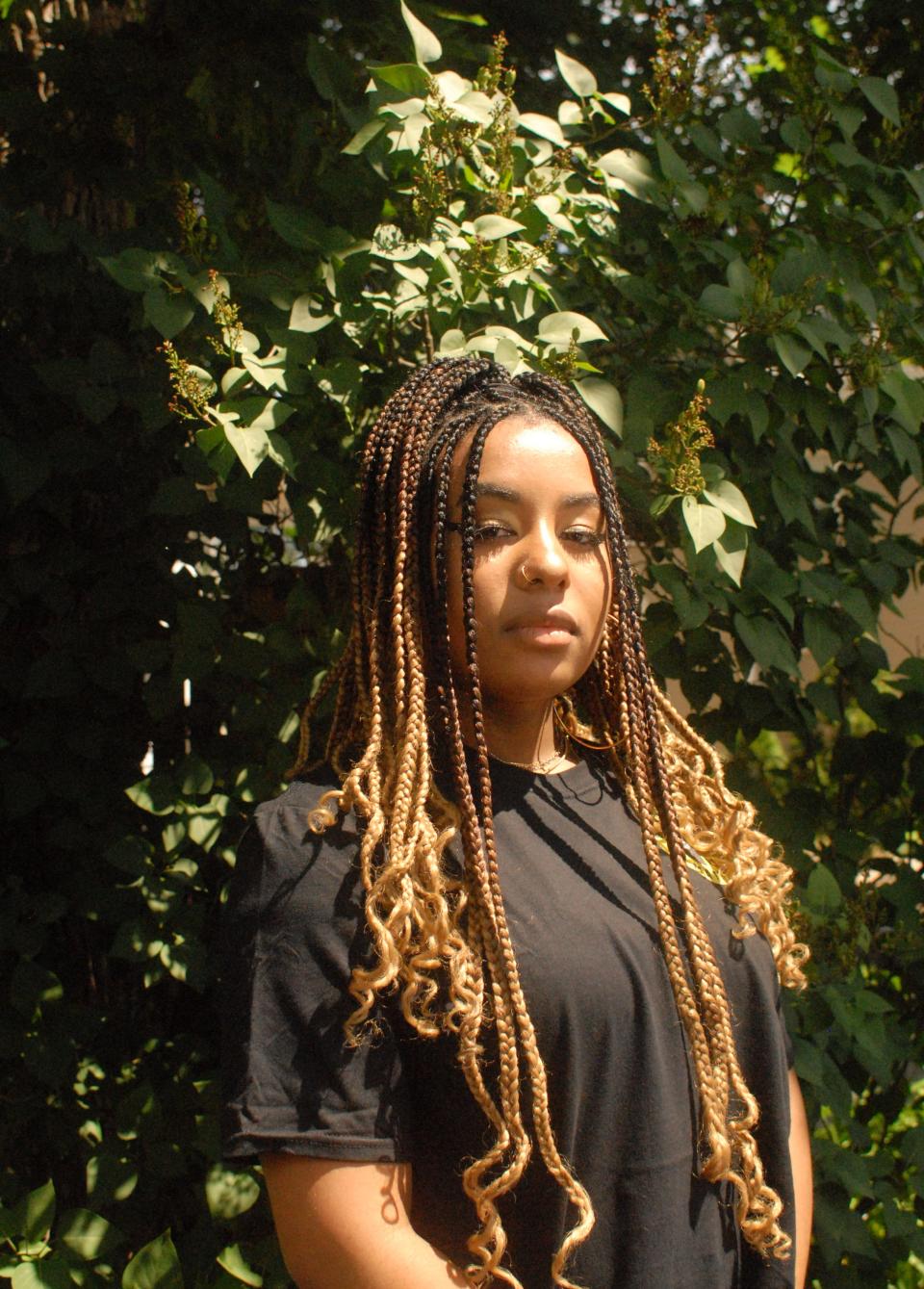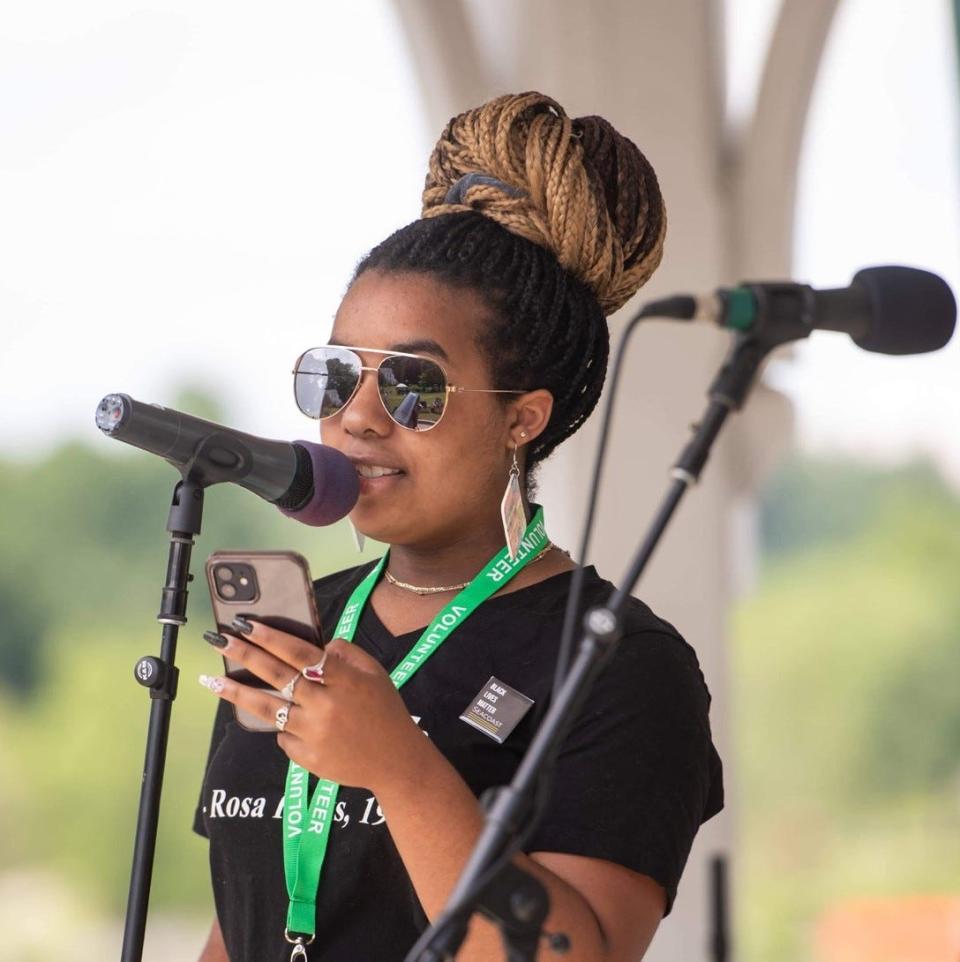'My chance:' Saniyah Bolton wants to lead, advocate for minorities amid climate change
EXETER, New Hampshire — "Climate change is the main cup of tea we need to be drinking right now," said Saniyah Bolton, sitting in the summer light outside the coffee shop where she works.
The 16-year-old Black Lives Matter organizer spoke passionately about what she perceives as the causes of a societal decline that's taken place just in her short life: environmental racism, grave inaction by lawmakers, consolidation of power at the top.
It was June, when Congress seemed to be at a stalemate over climate action. Bolton said she wished she could wipe the House and Senate clean and start from scratch.
It could be her moment, her generation's moment.

"Part of me is kind of like, 'Oh my god, this is my chance, this is my opportunity to help the world,'" she said. "But part of me is disappointed I have to be going over the exact same things, the things my idols did. Shouldn't we have learned from history?"
"I feel like the past decade, really things have just been going downhill."
How young people feel about climate change
The USA TODAY Network interviewed Bolton and other young people as part of "Perilous Course," a collaborative examination of how youths up and down the East Coast are grappling with the climate crisis. Journalists from more than 35 newsrooms from New Hampshire to Florida spoke with regular people about real-life impacts, digging into the science and investigating government response, or lack of it.
As part of the project, journalists profiled a handful of young people who have opinions about climate change and how it relates to their future.
Read more: The climate future is now. Humans navigate a ‘Perilous Course’ on the East Coast.
Bolton is a member of Gen Z, young people who were born between 1996 and 2012. A Pew Research Center study from 2021 found climate change is a top worry for them: 76% of Gen Z respondents said it was one of their biggest societal concerns.
That certainly rings true for Bolton, who feels that climate change "touches everything." During an hour-long interview, she rattled off carbon dioxide emissions, redistribution of wealth and the need for stronger global climate alliances as just a few things on her mind lately.
Young people: Some are students, activists. Some are just worried sick. Climate crisis is all they know.
Young Black Lives Matter organizer passionate about environmental justice
Bolton grew up in Reading, Pennsylvania, and moved to New Hampshire in middle school. She's a junior at Exeter High School, and hopes to attend a historically Black college or university down South after she graduates.
Her community involvement and awareness around climate change really kicked into gear when her mother co-founded a local Black Lives Matter chapter after George Floyd's murder. Bolton is the co-director of the chapter's youth division.
This year, she was recognized as one of five winners at Black Lives Matter Seacoast's excellence awards.

"I had always known about climate change and I’ve always been aware," Bolton said. "But I have really started to recognize more about what’s actually happening. Gen Z is becoming so aware of it."
Bolton is particularly interested in how climate change, the environment and racism are so intimately connected. She noted how people of color are disproportionately affected by extreme weather events and historically have poorer health outcomes due to their proximity to pollutants.
"Black people are more likely to have asthma and breathing problems," Bolton said. "Gas emissions and air quality, that’s a huge thing."
As a young Black woman herself, she's often representing a minority perspective in majority white spaces in New Hampshire. She's been asked to speak at climate protests, a platform she uses to lift up the experiences of people of color. Bolton sees minorities, particularly lower-income minorities, as the most vulnerable in the face of climate change.

"It’s a known thing in the U.S. that how our systems are set up, it’s going to benefit the people at the top while the lower class is just getting lower and lower," Bolton said.
'Education is the password to the future'
Bolton spoke directly to "billionaires and companies," saying, "Why don’t we take some of (your money) and put it into community gardens, composting areas, plant-based utensils, and services in school systems to learn more about climate change?"
She referenced Malcolm X on several occasions, specifically his sentiments regarding education.
"Malcolm X said education is the password to the future," Bolton said. "He’s right. When it comes down to it, we’re at our last minute. This is the finale. People who are going into power, people who are learning and growing, they need to be educated now."
— This article is part of a USA TODAY Network reporting project called "Perilous Course," a collaborative examination of how people up and down the East Coast are grappling with the climate crisis. Journalists from more than 35 newsrooms from New Hampshire to Florida are speaking with regular people about real-life impacts, digging into the science and investigating government response, or lack of it.
This article originally appeared on USA TODAY NETWORK: Young BLM activist: Minorities feel the brunt of climate change

